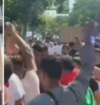Bangladesh’s Top Court Reduces Job Quotas
Bangladesh’s Supreme Court has made a significant ruling to reduce the quotas reserved for government jobs, a decision that comes in response to violent clashes across the country that have resulted in over 100 deaths. Previously, a third of public sector jobs were reserved for the relatives of veterans from the 1971 war for independence from Pakistan.
The court has now ruled that only 5% of these roles can be reserved for veterans’ relatives, while 93% of jobs will be filled based on merit and the remaining 2% reserved for ethnic minorities and people with disabilities.
Law Minister Anisul Huq has stated that the government will implement the ruling within days. He emphasized that the violent protests were influenced by opposition forces aiming to destabilize the country. He denied claims that Prime Minister Sheikh Hasina, in power since 2009, was losing control, citing public support for the government’s actions to end the violence.
Despite the court’s ruling, student leaders have vowed to continue their protests until their broader demands are met. These include justice for those killed in the protests, the release of detained protest leaders, the restoration of internet services, and the resignation of certain government ministers. The streets of Dhaka remain under curfew, and clashes have continued even after the ruling. The protests have seen significant casualties, with local media suggesting the death toll could be higher than the reported 115.
The quota system, which was scrapped by Prime Minister Hasina’s government in 2018 but reinstated by a lower court last month, has been a contentious issue. Critics argue that it has been exploited by the ruling Awami League party to reward its supporters, thereby entrenching its influence within the government. UK-based analyst Kamal Ahmed described the protests as a much broader movement against corruption, lack of accountability, and the rising cost of living.
In response to the unrest, the government imposed a harsh crackdown, including a curfew and a communications blackout. Protest coordinators allege that both the police and the student wing of the Awami League, known as the Bangladesh Chhatra League, have used brutal force against demonstrators, a claim the government denies. Numerous protestors have been detained, with reports of police mistreatment.



